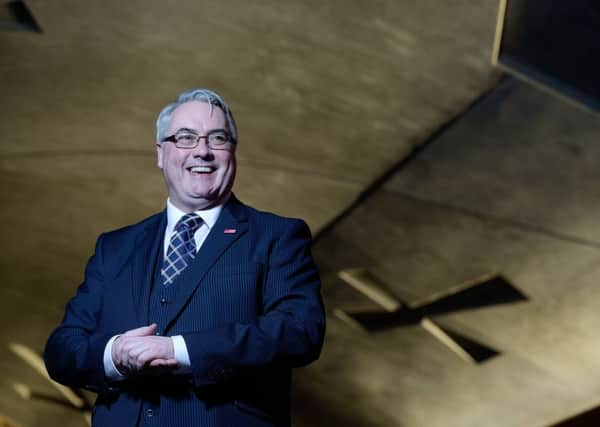Frank McAveety urges SNP to borrow for big city projects


Frank McAveety, the Glasgow City Council leader, has called for a major investment in Scotland’s largest city in order to stimulate the economy and combat the uncertainty of Brexit and threats of a second independence referendum.
Faced with cuts to the city’s budget, McAveety has been in talks with the Scotland’s Brexit minister Michael Russell to discuss his plans and has warned that failure to get going with the projects puts at risk substantial private investment earmarked for Glasgow.
Advertisement
Hide AdAdvertisement
Hide AdIn addition to the resurrected plan for the airport rail link, McAveety wants to see money invested in the Buchanan Quarter retail project around the famous galleries and Queen Street Station.
Another development is the Clyde Gateway, which involves projects in Dalmarnock, Rutherglen and Shawfield, where the plan is to develop vacant sites to build factories and business units to bring jobs to the area.
Speaking to Scotland on Sunday, McAveety said: “Some government departments need to shake a leg and Transport Scotland is an organisation that needs a good shake.
“We and the Scottish Government are in favour of the airport link, so bring it forward. They want the Buchanan Quarter to enhance retail to be brought forward, but we believe the delay in the Buchanan Quarter has possibly put at risk £300 million of private sector investment in Glasgow, which is money we can ill afford to lose.”
The draft budget unveiled by Finance Secretary Derek Mackay last month has put a further squeeze on the cash available to local government.
According to McAveety, Glasgow has revised the extent of the savings that have to be found from £130 million to £150m over the next two years. This comes on top of a reduction in the settlement received by Scotland’s largest council area since the SNP came to power.
“My critical point is that ever since the SNP came to power, Glasgow has had a reduction in its revenue budget,” said McAveety, the leader of the city’s Labour group. My view is that it can’t continue and I hope the finance secretary will listen to the calls for using some of the flexibility he has in terms of new money from the UK government and his capacity to raise further money through decisions he can make as a minister.”
Last week Mackay said he intended to use Holyrood’s new £450m borrowing powers “to the max”, despite getting an extra £800m from Westminster in the Autumn Statement.
Advertisement
Hide AdAdvertisement
Hide Ad“I don’t care what party you are in, Glasgow is Scotland’s economic power house so let’s get our shoulders to the wheel about investment,” said McAveety. “The reason investment is important to the city is that it reassures the business community that we are serious, because that is one of the things that worried them about the decision on the European Union. They were worried about the uncertainty around the potential other referendum.”
McAveety faces a tough battle for his own political future. With Jeremy Corbyn and Kezia Dugdale’s Labour Party performing poorly in the polls, it is widely anticipated that the party will lose control of Glasgow in the May local elections.
If the Nationalists wrest control of Glasgow from Labour, it will be seen as a defining moment in the fall of Scottish Labour.
McAveety was bullish about his party’s fortunes.
“I’m a fighter. I’m a resilient character. I have got bouncebackability – if that’s a word,” he said. Last week Labour launched its vision for local government with the production of a document recommending an extra penny on all income tax, reintroducing the 50p income tax rate for the highest earners and giving councils the power to levy land and tourism taxes.
When asked if it would be challenging to campaign for a tax-raising programme, McAveety said: “Labour does best when it is talking about the difference it is going to make to people’s lives. I think the Glasgow Labour experience has made a difference to the city. Even when Labour was in power in local government and in the Scottish Parliament, Labour councillors stood up for this city and challenged their own government repeatedly. The challenge in modern Scotland is the SNP councillors – when Nicola Sturgeon asks them to jump, they ask, ‘How high?’ That’s the difference. With me you will get someone putting Glasgow first. Not the SNP Edinburgh office.
Last night a Scottish Government spokesman said: “Taking next year’s local government finance settlement plus the other sources of income available to councils through reforms to council tax and funding for Health and Social Care Integration, the overall increase in spending power to support local authority services amounts to £241m or 2.3 per cent. The Scottish Government confirmed in the Draft Budget that it plans to make full use of the borrowing powers which come into effect next year in order to continue our investment in new infrastructure to support our public services and grow our economy. We are committed to working with all cities to unlock investment and are investing £760m over the next 10 to 20 years for City Region Deals, including Glasgow.”